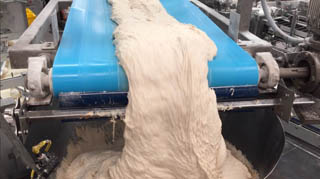What Are Your Light-Duty Conveyor Belt Cleaners Costing You?
 We all know what a dirty word carryback is in the food industry. Material that either sticks to the belt or falls off the belt onto the floor or onto other conveyor components can waste time, affect quality, destroy sanitation efforts, and challenge safety standards, among other things. And while people used to just chalk it up to the cost of doing business, others have recognized the need for belt cleaners, which is a good first step to optimizing operational productivity.
We all know what a dirty word carryback is in the food industry. Material that either sticks to the belt or falls off the belt onto the floor or onto other conveyor components can waste time, affect quality, destroy sanitation efforts, and challenge safety standards, among other things. And while people used to just chalk it up to the cost of doing business, others have recognized the need for belt cleaners, which is a good first step to optimizing operational productivity.
Choosing the correct cleaner
Recognizing the need is one thing. Choosing the correct cleaner for your application is another. Since your maintenance team knows the ins and outs of your conveyor, it’s natural to think that they can develop a cleaner that will conform perfectly to your system. And oftentimes, they do just that. Scrap conveyor belting, spare pieces of plastic, and even stainless steel are used to create devices that “scrape” the belt. While this is an inexpensive design that can remove some carryback, it is not always the best for the health of your belt or product removal from the belt, and it is far from sanitary.
Even some engineered cleaners cannot get the job done. They may look like they are up for the challenge, but are the blades made of food-grade materials, are the surfaces free of crevices that can harbor bacteria, and do they have a tensioning system to guarantee the blade-to-belt contact that will maximize its cleaning capability?
Not sure what the terms precleaner and secondary cleaner mean in relation to your conveyor belts?
Click here to check out our Belt Cleaning Systems page for a good description.
How cleaners affect your efficiency
Quality, productivity, time, and customer experience – these are just a few of the ingredients needed to run a successful operation and produce the best quality materials. Let’s discuss how a belt cleaner not designed specifically for use with food applications can sometimes may be doing more harm than good with a real-life story.
 Scenario: A local bread baking operation is running flatbread on its main conveyor for its most important customer. The holidays are coming up and they are expected to sell more items than usual. There are many different styles and flavors of flatbread and the customer prides themselves on freshness so the deadline is tight. But this operation has all the tools they need to accomplish this task. Or do they? How is their newly-installed light-duty cleaner going to hold up to this challenge?
Scenario: A local bread baking operation is running flatbread on its main conveyor for its most important customer. The holidays are coming up and they are expected to sell more items than usual. There are many different styles and flavors of flatbread and the customer prides themselves on freshness so the deadline is tight. But this operation has all the tools they need to accomplish this task. Or do they? How is their newly-installed light-duty cleaner going to hold up to this challenge?
- Quality: If your light-duty belt cleaner isn’t cleaning well enough, you will see a serious problem with product quality. Because the cleaner is not properly removing the excess dough, it is recycled and mixes with brand new dough, also mixing flavors together, which is a serious quality concern. In many cases, like this one, the dough is scrapped.
- Productivity: That same leftover flatbread dough is also costing you productivity as the cleaner is only contacting certain points of the belt and the rest of the product is falling to the floor. Instead of sending your maintenance team to work on proactive tasks, they are reacting by cleaning up falling product and trying to readjust the cleaner blade.
- Time (and Money): When the maintenance team goes to check on the cleaner, they notice it was installed backwards and upside down. The line is shut down while they take the cleaner out, flip it around, and reinstall it. Easier said than done thanks to the multiple components and vague instructions. It takes an hour and a half to fix it and even then, they still aren’t sure if it will work properly because the belt seems to be digging into the blade with no way to properly tension it. After $2000-$3000 in downtime already spent, they have to move forward.
- Customer Experience: They are able to send half the order out to the customer, but can’t promise that the company will get the other half by the deadline. The customer cannot operate with half their flatbread and has to resort to using frozen reserves that they normally use to ship out to customers across the country. The freshness guarantee plastered all over their menus will not be valid this weekend. They want to have a serious talk with the bakery about future business.
Now this scenario may look like a comedy of errors, but I can assure you that it wasn’t funny to the industrial baking operation that was experiencing it. And it is highly likely you will never face anything as extreme as this, but if even just one of these things happens on your conveyor line, what are the ramifications? Will you be missing a deadline, throwing out material, or recalling a product due to cross contamination? Will you be losing a customer? None of these things is acceptable in this day and age. There is just too much competition!
The right cleaner
The bottom line is that the right cleaner makes all the difference. When Flexco designed the FGS Food Grade Secondary Cleaner, we wanted to address quality, productivity, downtime, and customer experience, along with sanitation and worker safety. That’s why the FGS is easy-to-install and features solid, stainless steel components to make it easy to maintain. We’ve also made cleaning and sanitation a snap with quick and easy disassembly in less than a minute, with limited components and no need to remove the cleaner from the structure.
But don’t take my word for it. Click here to sign up for a demo – virtual or on-site – and we’ll bring the FGS cleaner straight to you to see if it will work for your operation.
Authored by: Ramses Banda Marquez, Product Manager
Banda Marquez manages the overall marketing strategy and activities associated with the light-duty mechanical fastener line and belt conveyor products. He brings expertise in marketing, product management, operations, engineering, and supply chain management to Flexco, along with extensive experience in distribution and international business. Banda Marquez also holds patents in both the U.S. and Australia. Banda Marquez earned a bachelor's degree in Mechanical Engineering from Baja California State University and a master's degree in Project Management from Keller Graduate School of Management.
Subscribe to the Flexco Blog
Related Blogs
Published Date
October 13, 2020Product Group
- Belt Cleaning Systems
Industries
- Food Processing
- Industrial Baking
Issues
- Downtime
- Maintenance
- Sanitation
